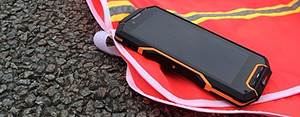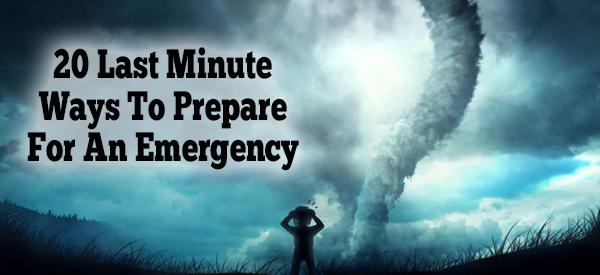The more prepared you are for an emergency the more likely you are to get through it without any serious harm – and the thing about preparation is it’s better to start long before disaster threatens. The ideal situation is to be completely prepared, so that when the S really does HTF you can take it in your stride.
Realistically, though, not many of us have the time or resources to reach that level of preparedness. We do what we can. Even if it’s not as much as it could be, it helps. It also gives you a foundation that, if necessary, you can build on with some last-minute preparation.
In most scenarios you’ll have some clue that things are about to go bad, and a bit of time – maybe a matter of hours, perhaps stretching to days of even weeks – to ramp up your level of preparedness. You can get a surprising amount done in a short time, so if it’s obvious that trouble’s on the way make the most of every minute you have before it hits.
Here are some suggested last-minute tasks:
#1 Get all the cash you can
ATMs won’t work if the electricity goes – but, if there’s a major crisis, they’ll quickly be emptied anyway as people panic. This is why you should keep cash in your emergency kits, but getting some more won’t hurt. Even if the disaster is severe enough that cash loses its value, it could take a while for most people to realize that – and, until they do, your dollars will come in useful.
#2 Stock up on gas
Fill your tank. Then fill your spare gas cans. If you get the chance, buy more gas cans and fill those too. In a serious emergency gas will be more valuable than cash. You’ll be able to stay mobile, run generators and trade surplus gas for other commodities.
Related: Best Fuels For Off-Grid Survival
#3 Find food
Hopefully you already have a good supply of food laid up, but adding a bit more won’t hurt – and this could be your last chance. The priority is staples like the ones you’ve already stockpiled, but almost anything non-perishable is worth having. Even if you don’t eat it yourself, food is a valuable trade item.
#4 Buy batteries
 Identify all the sizes of battery your equipment uses, and pick up as many as you can. Then, on top of that, grab every extra AA cell you can get your hands on. You’ll probably end up getting through a lot more of these than you expect, plus they’ll be a handy trade item.
Identify all the sizes of battery your equipment uses, and pick up as many as you can. Then, on top of that, grab every extra AA cell you can get your hands on. You’ll probably end up getting through a lot more of these than you expect, plus they’ll be a handy trade item.
#5 Refresh your water
While the water out the faucet can still be trusted, check your storage. If you have time empty out your containers, wash them and refill with fresh water. Be sure to do them one at a time. The last thing you want is for the supply to be shut off unexpectedly when you’ve emptied and cleaned all your containers, and you’re just about to start refilling them.
Related: 5 Water Storage Myths
#6 Collect essential documents
It’s a smart idea to keep essential documents together in an easily-grabbed packet. Passports, birth and marriage certificates, medical information, insurance policies… they should always be in a large envelope, ready to pick up and take with you. Check you have everything, and when disaster looms move them to your bug-out bag.
#7 Refill your prescriptions
If there’s medication you need, get down to the pharmacy and stock up. That’s especially important for prescription drugs – but don’t overlook over the counter ones. If there’s a long-running emergency do you really want to run low on Tylenol?
Here are The Only 4 Antibiotics You’ll Need when SHTF
#8 Overhaul grab bags
When was the last time you checked your bug out bag or emergency kits? Go through them now and check what’s missing. It’s likely something is; people tend to plunder them then forget to replace whatever they took out. Remedy that while you have time.
#9 Fill the freezer
If there’s space left in your freezer fill plastic bags with water, seal them and put them in there. The less air space there is in the freezer, the longer it will stay cold if the power goes. Extend that even more by not opening the door unless you have to – but this has less effect on a full freezer, because less warm air can get in.
#10 Explore unusual storage
Is there a storm coming? If you’re worried about storm damage and heavy rain, put all your valuable documents, cash and vulnerable electronics in the dishwasher. It’s one of the most waterproof places in your house. Just make sure to unplug it.
#11 Secure doors and windows
Whatever kind of emergency is approaching, you want to make sure your home is secured against both natural and human hazards. If you have storm windows, fit them. Board up exposed windows and those in rooms you don’t use much.
#12 Prepare for blackouts
However well prepared you are, there’s always a chance of having to do without power for a while. Have flashlights ready, with fresh or fully charged batteries fitted. Do you have a fireplace you can cook in? Have a supply of wood ready, either indoors or under shelter. Make sure you have a non-electric can opener, too.
#13 Guard against fire
Most emergencies increase the risk of fire in some way. They also make it vital to avoid fires – if society is already collapsing around you, the last thing you need is to burn your house down by accident. Place extinguishers near fire hazards. Water or sand buckets are good too, as are fire blankets.
#14 Charge your gadgets
 Round up every device that has a rechargeable battery, and put them on charge. Leave them plugged in unless you absolutely have to disconnect them. That way, if the power goes out, you’ll be starting with everything as fully charged as you can get it.
Round up every device that has a rechargeable battery, and put them on charge. Leave them plugged in unless you absolutely have to disconnect them. That way, if the power goes out, you’ll be starting with everything as fully charged as you can get it.
Related: You Will Not Survive an EMP Without This Gadget
#15 Get a car charger
Even if the power’s out the chances are you can still charge anything that has a USB port. Unless an EMP has disabled your car, it can generate electricity. Most cell phones and other electronics (not all – thanks, Apple) have standardized on Micro USB connectors, so a car charger for your phone will also charge a range of other gadgets.
#16 Set up emergency lighting
Murphy’s Law says that when disaster strikes it’ll happen in the middle of the night. That’s not the time to be wondering where you put the flashlight. Make sure you have emergency lights distributed through your home where they can be quickly found and activated. Cyalume lightsticks are a good option – they’re cheap enough to place lots of them. They don’t give a lot of light, though, so have flashlights ready and battery operated lanterns in your main living spaces.
#17 Prepare your tools
Depending on what kind of emergency you’re facing, you might want to have some tools ready to deal with its aftermath. For example a storm is likely to damage or even bring down trees. If you need to clear your driveway, or fell a damaged tree that’s threatening to fall on your house, you’re going to need a chainsaw – and the skill to use it. You don’t want to be learning how to use tools in a disaster situation; master them when it’s not urgent.
#18 Do the laundry
No, this doesn’t seem like a priority. Yes, it’s a really good idea. If the power is off for a long time you’ll be glad of a supply of clean clothes – and hand washing is a real drag. The longer you can put it off the better. It doesn’t matter if you don’t get the laundry dry before the power goes off, as long as you get it clean.
#19 Stormproof your home
If heavy weather is what’s threatening you, do all you can to protect your home in advance. Clear away loose clutter outside; in a high wind it can become dangerous missiles. Clear gutters and downpipes so rain can flow off freely; blocked gutters can quickly lead to water damage. Check storm drains too, and clear out any debris.
#20 Sort some snacks
When the emergency hits, you could be pretty busy for a while. It isn’t going to be much fun if you’re hungry as well as busy, but it could be a while before you get a chance to stop and cook. Prepare some food in advance – stuff that will last without power. Sandwiches, jerky or fruit will help keep you going. A Thermos of soup will be a big morale boost through a stormy night, too. It seems like a small detail, but often in preparedness it’s the details that make the difference.
You may also like:
 Venezuela: This is How SHTF Will Look Like
Venezuela: This is How SHTF Will Look Like
Do You Make These Fatal Mistakes In A Crisis? (video)
Survival Food 59 Long-Term Survival Foods and Supplies at the Grocery Store















While this might be a good list for those who have JUST begun prepping, Those of us who have been doing it even for a month or two should ALREADY have done these things.
Extra Rx’s are NOT easily obtained…the insurance dictates that and usually not more than 5 days before they run out. Begin NOW to get more: Ask your doctor to double the dose for a couple of months so you can begin stocking up, meaning you can stock up the extras. If your Rx isn’t expensive, buy an extra month every so often to add to your extras. I did this with one Rx, but another without insurance it was over $600! Contact your insurance company and ask to increase your supply in case of shortages, supply issues, etc.
Those living in tornado or hurricane prone areas should already have plywood to cover windows, taken care of home maintenance to prepare for rain, wind and other normal weather that comes with the ‘territory’.
Those in earthquake prone areas should be prepared for those disasters as well by putting clothing, light sources, shoes and socks near beds in case you need to grab them quickly. Also, remember your pets. They have needs like food, water and medicines, leashes, collars, harnesses, carriers, etc, too.
Having a bit of cash on hand, in small bills and change should be another habit you have already formed. Enough to get by for a few days in case electricity (cash machines, cash registers) and banks are out of service. You won’t be able to get fuel (gas, diesel) as the pumps won’t work, so those should already be stored for emergencies.
Food and water storage should already be done. If you are low, then perhaps get more if you can find any, as others will be doing the same. Start NOW! Don’t wait until the emergency is already approaching, ASSUMING there is time to act.
Items for use for shelter should also be in your “preps”…tents, ponchos, tarps, etc. are easy ones to obtain. In case you are somehow forced from your home, you will need a shelter from weather. Your vehicle might be one place …store extra items there if possible.
Extra batteries, ways to cook, light and heat without power, fire extinguishers, all are prepping items you should already have. These are just the normal items in daily taking care of business as people who are prepared for disaster.
Doing laundry, running the dishwasher to ensure enough clothing and a clean kitchen to avoid health issues is a great idea. You can also get a water BOB now and use it to fill your bathtub with water for either washing, flushing, or filtering for drinking.
If you are totally new to being prepared for emergencies like weather (earthquakes, tornadoes, hurricanes, floods, etc.), power outages, social turmoil, supply shortages, and even nuclear detonation and EMP/CMP, you need to begin now. It isn’t difficult, just add to your shopping with one or two extras of what you normally eat, store water, ways to cook, light, heat without power. Medicinal supplies and other items you will NEED.
If you are a ‘seasoned’ prepper, these things should already be in your stockpile.